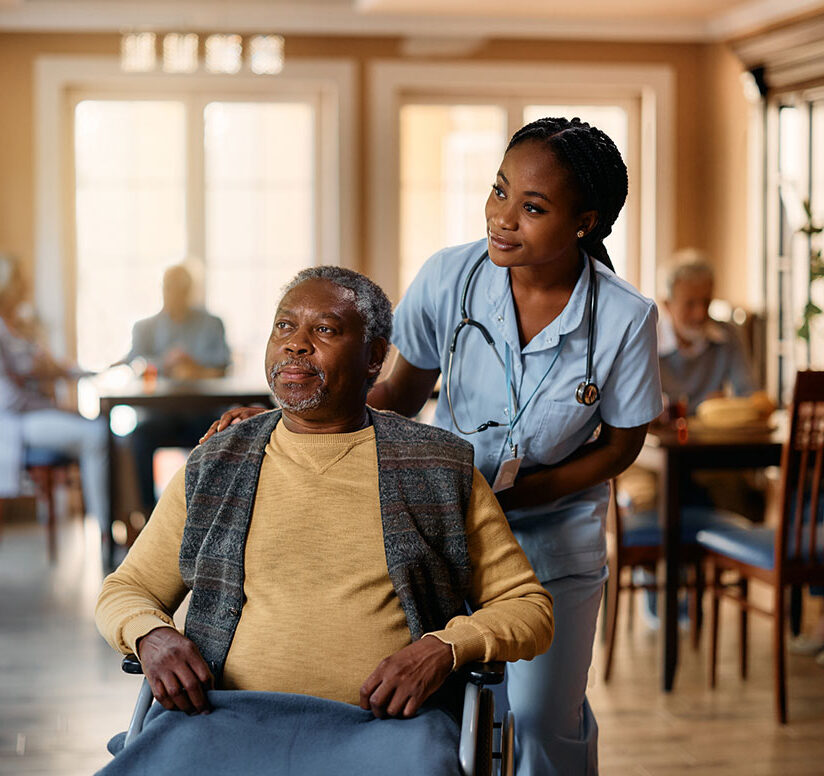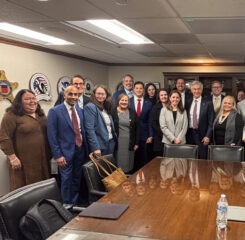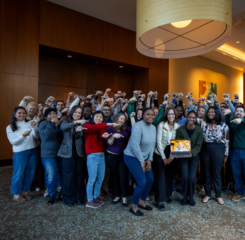CMS Updates Focused Infection Control Survey Triggers
CMS issued a revised memo QSO-20-31-ALL-REVISED on January 4 detailing new triggers for focused infection control surveys. In addition to the 2 triggers previously identified, CMS has added 5 additional scenarios that will be used to help state survey agencies identify survey targets. The new criteria are effective immediately. The memo also contained FAQs related to survey process and protocols and new contact emails for survey-related questions.
Focused Infection Control Survey Criteria
As outlined in the original memo issued June 1, 2020, focused infection control surveys must be initiated within 3-5 days of identification for nursing homes that report 3 or more new COVID-19 cases in the past week or 1 new resident case in a nursing home that was previously COVID-free. National Healthcare Safety Network (NHSN) data is utilized for these criteria. With the January 4, 2021 update, CMS has now outlined the following additional criteria for triggering a focused infection control survey:
- Multiple weeks with new COVID-19 cases,
- Low staffing,
- Selection as a Special Focus Facility,
- Concerns related to conducting outbreak testing per CMS requirements, or
- Allegations or complaints that pose a risk of harm or immediate jeopardy to the health or safety of that are related to certain areas such as abuse or quality of care (e.g. pressure ulcers, weight loss, depression, decline in functioning).
In order to trigger a focused infection control survey, nursing homes must meet one of the original case criterion (3 or more new cases or one new resident case) plus at least one of the new criterion. CMS will assist state survey agencies (SSAs) in identifying nursing homes that meet the above criteria. State survey agencies must initiate survey within 3-5 days of identification and should coordinate with the state Healthcare Associated Infection (HAI) coordinators prior to initiating survey.
CMS notes that a survey may not be necessary for nursing homes meeting the above criteria if the nursing home received an onsite focused infection control survey in the 3 weeks prior to meeting the criteria, either as a stand-alone survey or as part of a recertification survey. Determination of whether to conduct a survey under these circumstances will be based on the situation at hand. State survey agencies may request information in making this determination; however, there is no requirement that an off-site record or documentation review must be conducted when it is determined that an on-site survey will not take place. Also, should a nursing home continue to meet criteria in the fourth week following a focused infection control survey, a new focused infection control survey should be initiated.
Recall that in the original June 1, 2020 memo, state survey agencies were directed that 20% of nursing homes in a state must receive a focused infection control survey in FY 2021. Surveys triggered based on the above criteria may be counted toward this requirement. CMS has specified, however, that only stand-alone focused infection control surveys may be counted. If a focused infection control survey occurs as part of a recertification survey, the survey will not count toward the state’s 20% minimum.
Enhanced Enforcement
Recall that the June 1, 2020 memo introduced enhanced enforcement related to infection control citations. These enhanced enforcements remain in effect and are as outlined below:
|
Citation History |
Level D or E (not widespread) |
Level F (widespread) |
|
No citations at F880 in past year or last standard survey |
Directed Plan of Correction |
Directed Plan of Correction
Discretionary Denial of Payment for New Admissions (45 days to demonstrate compliance) |
|
One citation at F880 in past year or last standard survey |
Directed Plan of Correction
Discretionary Denial of Payment for New Admissions (45 days to demonstrate compliance)
Per Instance Civil Monetary Penalty up to $5,000 |
Directed Plan of Correction
Discretionary Denial of Payment for New Admissions (45 days to demonstrate compliance)
$10,000 Per Instance Civil Monetary Penalty |
|
Two or more citations at F880 in past 2 years or last 2 standard surveys |
Directed Plan of Correction
Discretionary Denial of Payment for New Admissions (30 days to demonstrate compliance)
$15,000 Per Instance Civil Monetary Penalty (per day CMP may be imposed as long as total amount exceeds $15,000) |
Directed Plan of Correction
Discretionary Denial of Payment for New Admissions (30 days to demonstrate compliance)
$20,000 Per Instance Civil Monetary Penalty (per day CMP may be imposed as long as total amount exceeds $20,000)
|
Nursing Homes cited at F880 at Level G, H, or I, regardless of past history, will be imposed: Directed Plan of Correction, Discretionary Denial of Payment for New Admissions with 30-days to demonstrate compliance, and a CMP imposed at highest amount option within the appropriate (non-Immediate Jeopardy) range in the CMP analytic tool.
Nursing Homes cited at F880 at the Immediate Jeopardy Level (Level J, K, L), regardless of past history (in addition to the mandatory remedies of Temporary Manager or Termination) will be imposed: Directed Plan of Correction, Discretionary Denial of Payment for New Admissions with 15-days to demonstrate compliance, and a CMP imposed at highest amount option within the appropriate (IJ) range in the CMP analytic tool.
These enforcements have not changed with the revised memo.
Survey and Surveyor Protocols
Consistent with prior guidance to surveyors, survey and surveyor protocols may be adjusted due to COVID-19 infection control practices. On-site surveys, including health inspections, emergency preparedness, and Life Safety Code inspections, will be conducted regardless of a nursing home’s outbreak status. Surveyors should arrive on-site equipped with the personal protective equipment they will need to complete survey activities.
In the event of active confirmed or suspected cases within the nursing home, one surveyor will be assigned to the COVID-positive unit. This surveyor will survey only on the COVID-positive unit and will have no in-person contact with other survey team members. Communications will be conducted through alternative means including electronic communication or virtual conference. Activities such as dining observation or Resident Council interviews will be adjusted to prevent further COVID-19 transmission. Emergency Preparedness and Life Safety Code survey activities, such as the facility tour and smoke/fire barrier inspections, may also be adjusted to accommodate appropriate infection control practices. Surveyors should aim to complete all initial pool activities, including interviews with COVID-positive residents, within the first 8-10 hours of survey. Additional activities, such as documentation reviews and exit conferences, may take place off-site.
CMS states explicitly in the FAQs that while CMS strongly encourages states to requires testing of surveyors, CMS does not have the authority to mandate testing of state employees (state surveyors). Nursing homes may offer testing to surveyors; surveyors may refuse testing. Note that nursing homes cannot deny surveyor entry into the nursing home. Denying surveyor entry may result in termination of the provider agreement. If a nursing home has concerns with a surveyor’s entrance into the nursing home due to active signs or symptoms of COVID-19, the nursing home should confer with the state survey agency and, if necessary, the CMS regional office.
1135 Waivers
In the initial months of the public health emergency, CMS issued a number of federal regulatory waivers, including physical environment and Life Safety Code waivers. Waivers remain in effect at this time and can be accessed here. Recall that the following activities were explicitly not waived and will be surveyed:
- Sprinkler system monthly electric motor-driven and weekly diesel engine-driven fire pump testing
- Portable fire extinguisher monthly inspection
- Elevators with firefighters’ emergency operations monthly testing
- Emergency generator 30 continuous minute monthly testing and associated transfer switch monthly testing
- Means of egress daily inspection in areas that have undergone construction, repair, alterations, or additions to ensure their ability to be used instantly in case of (emergency
- Documented orientation training program related to the current fire plan in lieu of conducting fire drills
CMS has provided in the revised memo a list of all waived regulations and the corresponding F-tag or K-tag.
What This Means for Members
This new survey prioritization will provide relief for nursing homes as they continue to scale mountains daily to protect the residents living in their communities and the staff who serve them. Nursing homes will no longer need to divert time, energy, and attention away from resident care to meet demands of frequent and repeated surveys. Likewise, state survey agencies will be able to better focus and allocate resources to nursing homes where more assistance is needed to provide the safe and high-quality care that our members are accustomed to providing. Keep in mind, however, that the impact of this revised memo will depend in part on your state survey agency and the circumstances in your community. Be sure to review information on waivers, including the F-tag and K-tag crosswalks provided by CMS to ensure you are prepared for your next survey.

Most Recommended
October 15, 2025
 Shutdown Week Three: Impact of Ongoing Closure on Affordable Housing
Shutdown Week Three: Impact of Ongoing Closure on Affordable Housing
December 10, 2025
Fiscal Year (FY) Funding 2026
October 07, 2025
Immigrant Workforce Matching Program Brings Workforce Relief
Recently Added
January 12, 2026
 LeadingAge Joins CMS' Oz in Hospice, Home Health Fraud Roundtables
LeadingAge Joins CMS' Oz in Hospice, Home Health Fraud Roundtables
January 12, 2026



